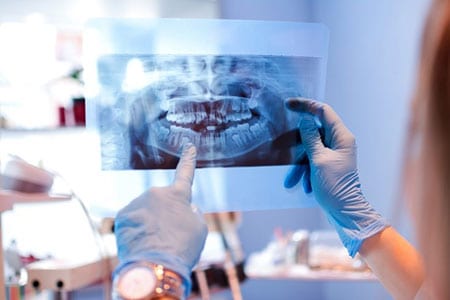Oral Surgery In Whitehouse, OH
When the state of a patient’s mouth deteriorates to the point that overall oral health is at risk, the techniques of oral surgery provide advanced, effective solutions. Oral surgeons save teeth, vanquish pain, revitalize gums and provide emergency interventions.
Oral surgical procedures can also be used to prepare the mouth for subsequent treatment, such as when teeth are extracted to make way for orthodontic care. Our skilled dentists offer a range of oral surgical services, from wisdom teeth removal to treatment of injuries to the jaw, joints and face.
Advanced Skills
Oral surgery is a dental specialty, but it’s also part of the basic training for general dentists. Many routine treatments are procedures that involve oral surgery. Root canals and dental implants are two examples. Saving a severely infected tooth involves clearing its interior by removing the inflamed pulp and infected nerve, disinfecting the hollow chamber and capping the tooth with a secure crown.
Implants are anchored in the mouth with strong titanium posts that are surgically placed in the bone of the jaw. This requires a broad understanding of the jaw, bone, facial nerves and structures below the gum line, along with a high level of surgical precision. Once the new artificial roots bond with the bone, each is topped with a natural-looking artificial tooth.
Complex Cases
Bone grafting and flap surgery are also specific oral surgical techniques. Grafting may be necessary in complex dental implant procedures. Flap surgery and sometimes also grafting of soft tissue or bone is used for cases of severe periodontal disease. This is when the depth of a gum pocket has expanded beyond 6 mm and the tooth is at risk of loosening and falling out.
Dysfunction in the mouth and jaw often require the techniques of oral surgery. The task of identifying, evaluating and removing tumors is entrusted to dentists with oral surgery training. When the joints that control jaw movement are injured as a result of trauma, oral surgery may be necessary to restore function and eliminate pain. Oral surgeons are also equipped to treat injuries in many other areas of the lower face.
Jaw Function
Oral surgery is sometimes used as a last-resort solution for TMJ, an intractable condition affecting the jaw joints. There are a variety of noninvasive treatments that are typically used for TMJ, ranging from mouth guards and muscle relaxants to injections of corticosteroids and insertion of needles to clear out debris that may be interfering with proper functioning of the joint. If these non-surgical options are ineffective, the surgical procedures known as condylotomy or arthrotomy may be tried. This is more often true in very severe cases, as when the jaw has completely locked.
Tooth Extraction/Wisdom Teeth Removal

The wisdom teeth are the third molars located at the far back of the mouth. Because they are the last adult teeth to come in, there is often not enough space for them, causing them to become “impacted.” Impacted wisdom teeth may be painful, shift other teeth out of alignment, and trap plaque and bacteria that can cause gum disease. When wisdom teeth become a problem, our dentist may suggest removing one to four of them.
Sometimes, other teeth need to be removed for the health and functionality of your mouth. While our dentists make every effort to preserve natural teeth when possible, tooth extraction can become necessary if a tooth is severely damaged or decayed. Before removing an unhealthy tooth, the dentist will also propose restoration procedures to fill in the missing gap. Leaving a vacant space in the smile for too long can lead to other adverse health effects like gum disease, weakened bite, and misalignment.
Oral Surgery Recovery
Local anesthesia helps patients to stay comfortable during their surgery, though they can often expect to notice discomfort once this wears off. Our dentists prescribe pain medication to help manage any lingering discomfort at home. For the first couple days following surgery, patients should prioritize rest and relaxation. Ice packs, used in short intervals, can help to reduce swelling. Foods that are soft and at room temperature are also gentler on the mouth. Dental Health Associates of Whitehouse will schedule follow-up appointments to ensure the patient is healing without complications.
To learn more about oral surgery, or to schedule an appointment, contact Dental Health Associates of Whitehouse today.


